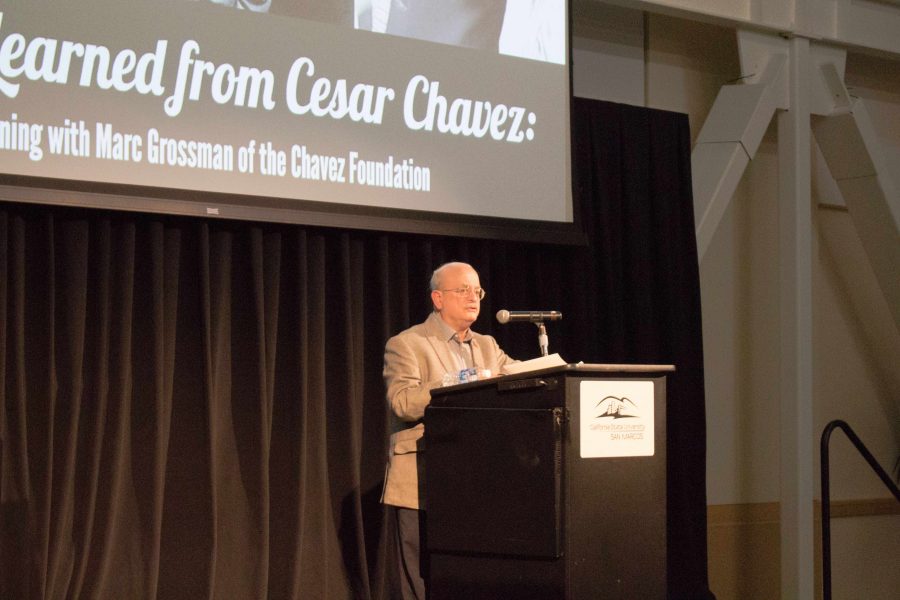Grossman gives insight on the Chavez legacy
December 9, 2016
On Wednesday, Nov. 30, former press secretary for Cesar Chavez, Marc Grossman, spoke to students and staff in the USU Ballroom.
Grossman, the current Communications Director for the Chavez Foundation, discussed the life, legacy and personal impact of the late Cesar Chavez.
Grossman discussed the life of Chavez before his activist days. Chavez grew up in the small agricultural city of Yuma, Arizona.
Years after earning wages as a farm worker and finishing his service with the Navy that began in 1946, Chavez’s work as an activist began. In 1952 he joined the Community Service Organization (CSO), a Latino civil rights group. His position in CSO allowed Chavez and his family to break into the middle class, according to Grossman.
His position didn’t last long. CSO refused to let Chavez organize workers and this led to his departure. Chavez and his family moved into a smaller place as he tried to recruit members for his own cause, which later manifested into the United Farm Workers labor union.
According to Grossman, non-violence was a major cornerstone for Chavez. This belief often met criticism from some farm workers.
Grossman recounted that Chavez would say, “It is my deepest belief that only by giving our lives, we find life. I am convinced that the truest act of courage is to sacrifice ourselves for others in a totally non-violent struggle for justice. To be a man is to suffer for others. God, help us be men.”
Chavez relentlessly backed up his words with his resilient form of leadership. He had no intention of putting himself above those involved in his cause. When people would interact with Chavez, they would be reminded of their fathers, sons, uncles or grandfathers, Grossman said.
Grossman addressed a time when a reporter followed Chavez and witnessed how workers admired him.
“The feeling is mutual,” the soft-spoken Chavez would reply. His response, further evidence of his pure selflessness.



Marc Grossman • Dec 18, 2016 at 12:02 pm
Jesse Rojas is a Central Valley Republican consultant and a mouthpiece for Fresno-bsased Gerawan Farming Inc., one of the nation’s largest tree fruit growers and a serial farm worker abuser that has been found guilty of serious, multiple and repeated violations of California’s farm labor law. Among those violations are illegally orchestrating and supporting a campaign to get rid of the United Farm Workers and avoiding paying its workers millions of dollars in back pay and other benefits by refusing to honor a state-ordered union contract. Pick Justice, the website Jesse Rojas wants people to visit, is an anti-union operation of right-wing anti-government guru Grover Norquist, who has mounted a sophisticated PR campaign supporting Gerawan’s lawbreaking.
For more, see: http://www.huffingtonpost.com/arturo-s-rodriguez/bigmoney-radical-right-gr_b_5786868.html
http://www.latimes.com/business/la-fi-ufw-gerawan-20150918-story.html
http://www.ufw.org/_board.php?mode=view&b_code=gerawan_news&b_no=17402&page=1&field=&key=&n=161
http://www.ocregister.com/articles/workers-712405-board-gerawan.html
Marc Grossman • Dec 15, 2016 at 11:01 am
Jesse Rojas is a Central Valley Republican political consultant and mouthpiece for Gerawan Farming Inc., a giant Fresno-based tree fruit grower repeatedly convicted of serious, multiple and repeated violations of California farm labor law, including illegally orchestrating and supporting a campaign to get rid of the UFW. Gerawan has avoided paying its workers millions of dollars in back pay by refusing to implement a state-ordered union contract. Pick Justice is part of a sophisticated PR campaign orchestrated by Gerawan with help from right-wing political guru Grover Norquist through his anti-union group, Center for Worker Freedom. For more, see:
http://www.ocregister.com/articles/workers-712405-board-gerawan.html
http://www.ufw.org/_board.php?mode=view&b_code=gerawan_news&b_no=17402&page=1&field=&key=&n=161
http://www.latimes.com/business/la-fi-ufw-gerawan-20150918-story.html
http://www.huffingtonpost.com/arturo-s-rodriguez/bigmoney-radical-right-gr_b_5786868.html
Jesse Rojas • Dec 12, 2016 at 10:29 am
César Chavez would be appalled at what Marc Grossman is doing today. The United Farm Workers has lost 90% of its members while Grossman has been in leadership there. In just the last few years, THOUSANDS of farm workers have protested in the largest strike protests in California’s farm labor history, and all have been AGAINST UFW, not for it.
Grossman’s UFW is so desperate that it no longer want workers to have a choice, but rather UFW tries to forced itself on the workers. UFW’s tactics caused more than 2,500 $15 per hour Fresno grape workers to lose their jobs.
See more at http://www.pickjustice.com